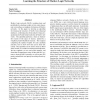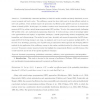379 search results - page 41 / 76 » Probabilistic (logic) programming concepts |
ENTCS
2002
13 years 9 months ago
2002
In this paper, we develop the notion of fuzzy unification and incorporate it into a novel fuzzy argumentation framework for extended logic programming. We make the following contri...
JLP
2007
13 years 9 months ago
2007
Several induction theorem provers were developed to verify functional programs mechanically. Unfortunately, automatic verification often fails for functions with accumulating arg...
ICML
2005
IEEE
14 years 10 months ago
2005
IEEE
Markov logic networks (MLNs) combine logic and probability by attaching weights to first-order clauses, and viewing these as templates for features of Markov networks. In this pap...
EOR
2010
13 years 10 months ago
2010
Abstract: Probabilistically constrained problems, in which the random variables are finitely distributed, are nonconvex in general and hard to solve. The p-efficiency concept has b...
ITP
2010
14 years 1 months ago
2010
CertiCrypt is a general framework to certify the security of cryptographic primitives in the Coq proof assistant. CertiCrypt adopts the code-based paradigm, in which the statement ...


